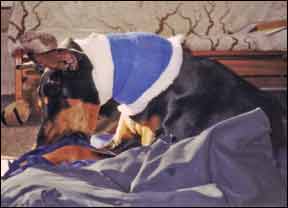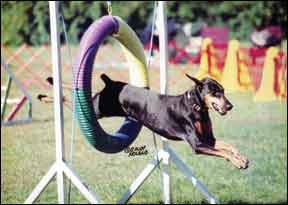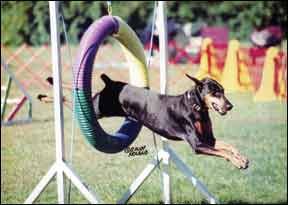Your dog is limping and you don’t know why, so you take him to your veterinarian. The vet pushes, pulls, and palpates and announces that your dog probably has torn ligaments in his knee. She says that he needs surgery, and she can take care of that.

Photo by Christy Waehner
288
While you love your dog’s vet, you’re just not sure that you agree, and you’re also unsure whether surgery is the route you want to take. You feel uncomfortable thinking the thought, but wonder what another veterinarian might recommend.
I’ve sought second opinions when I need to know more, or when I think that a specialist’s eyes, hands, and training might offer a different perspective on the initial diagnosis. When faced with serious illness in my Bouviers (who were young at the time), I didn’t hesitate to seek out a second opinion. In two cases – Axel’s immune mediated thrombocytopenia and Jolie’s back problem – I didn’t doubt the competency of the care being offered by their veterinarians; I simply wanted to be sure that the diagnosis was accurate and that I’d explored all my treatment options. I shared my decision to solicit another opinion with my veterinarians, and they gave me their full support.
After an exam by a board-certified internist, Axel’s primary care veterinarian continued to treat him, and was willing to incorporate alternative modalities into Axel’s treatment plan.
In Jolie’s case, we solicited input from her primary care veterinarian, a veterinary chiropractor, a surgeon in private practice, and finally from a board-certified neurologist at a veterinary college’s small animal teaching hospital. In both cases, we had successful outcomes and a continued good relationship with our primary veterinarians.
In my opinion, a second opinion is a good thing. We are the advocates for our dogs’ health. If I have any doubts, questions, or even just a niggling feeling that I can’t put my finger on, I will opt for a second opinion. I’ve done it enough times now to feel comfortable doing so, and there’s no reason that all dog guardians shouldn’t be, too.
Always okay
A strong proponent of second opinions, Nancy Kay, DVM, DACVIM, devoted an entire chapter of her book, Speaking for Spot: Be the Advocate Your Dog Needs to Live a Happy, Healthy, Longer Life, to reassuring pet owners about looking past their primary veterinarians when they want more information about the animal’s condition. (The chapter is titled “A Second Opinion Is Always Okay.”)

Photo by Cindy Noland
288
According to Dr. Kay, “Second opinions serve two valuable purposes. The clearest benefit is for your pup . . . The other beneficiary is you – second opinions tend to be reassuring, and allow you to feel you are doing the best job possible for the dog you love so dearly.”
Dr. Kay’s book is a great resource for anyone considering seeking a second opinion. Many of the concerns I had are ones she’s heard many time before, including:
– What will my dog’s veterinarian think? Despite the fact that you might feel uncomfortable doing so, it’s in everyone’s best interest that you share with your dog’s vet your plan to seek a second opinion. She should support your decision.
If my dogs’ veterinarians had reacted negatively to my decisions to seek second opinions, I’d be thinking long and hard about what kind of relationship we had, and whether it should continue. A veterinarian who is confident in her skills and relationship with you will not take offense with your seeking a second opinion.
Board-certified veterinary surgeon Alan Cross, DVM, DACVS, is an orthopedist at Georgia Veterinary Specialists in Atlanta. If a client brings a dog to him for an exam, and subsequently informs him that she’ll be seeking another opinion for a diagnosis/treatment plan, he’s agreeable. “It’s important that the owner believes in treatment they decide to pursue. If they have doubts, I don’t want to operate on that patient.” His only request is that the client takes her dog to another board-certified surgeon (if dealing with a surgical decision).
– To whom will I go? Dr. Cross’ request makes sense to me, as my preference when seeking a second opinion is to go to a board-certified specialist, or a veterinarian who specializes in the type of condition the dog has. Dr. Kay points out that it might be possible – and easy – to see another veterinarian within your dog’s clinic if you frequent a multi-vet hospital, but cautions that you might encounter a situation where the veterinarians have practiced together for so long that their thinking is similar.
For me, finding a resource outside the clinic is the way to go (unless it is a multi-specialty practice). Look first to your dog’s veterinarian for a recommendation; otherwise, search for a board-certified specialist on the certifying organization’s website, and at veterinary colleges.
Often, condition-specific discussion lists (i.e., tick borne disease, irritable bowel disease, etc.) on the internet are available, and list members might be able to provide you the name of an expert in your area. Sometimes it is necessary to drive a little further for a good second opinion. For me, the trip is worth the time.
– Won’t they run all the same tests? Not necessarily, and this is another reason to tell your dog’s veterinarian that you’ll be seeking a second opinion and with whom: she’ll be able to forward all copies of test results to the specialist.
In many cases, a second opinion visit will consist of only an exam and a discussion; you won’t necessarily need to sign up for a barrage of tests, and it won’t drain your wallet. But, if the specialist comes up with a completely different diagnosis, then be prepared to run tests to confirm the diagnosis. And, yes, it is possible that a third opinion might be in order.
– Are there alternatives? Christy Waehner of Atlanta does her best to seek a second opinion if the initial treatment plan doesn’t offer alternatives – preferably, an alternative to western medicine. When her Doberman, Sylvia, was diagnosed with wobbler syndrome (compression of the spinal cord in the neck caused by vertebral instability) the vet recommended surgery.
Although she loved her veterinarian, Waehner asked him whether there might be another option, given that Sylvia’s temperament would not lend itself well to the type of recovery required post-surgery. On her behalf, he reached out and found another veterinarian willing to implant gold beads (the procedure is an alternative therapy related to acupuncture). After a successful procedure, Sylvia returned to competing in agility.
The one situation in which there isn’t time for another opinion is when your dog is in the throes of a medical emergency. Dr. Kay recommends planning for that scenario by doing your homework ahead of time and knowing which emergency clinics in your area offer the kind of care you expect.
Second opinions are typically good things when approached with the support of your veterinarian, the right attitude, and realistic expectations given your dog’s condition. Ask questions, including “What is the typical outcome in cases like this? Best case? Worst case?” We rarely get miracles, but we can get some peace of mind knowing that we’ve gone the extra mile to help our dogs.
Lisa Rodier shares her home with her husband and senior Bouvier, Jolie.






